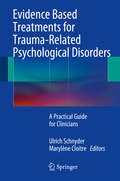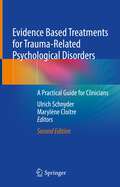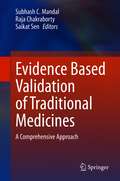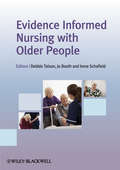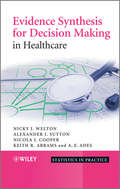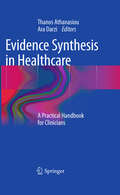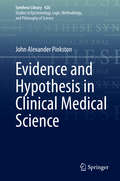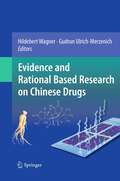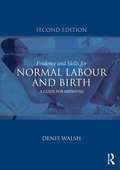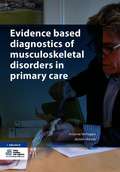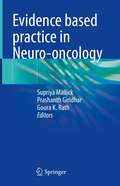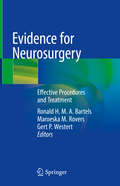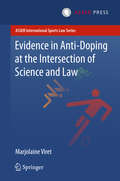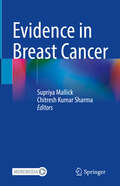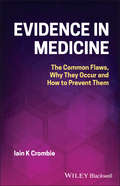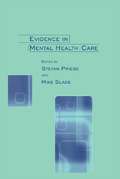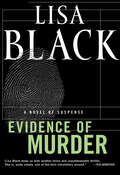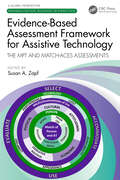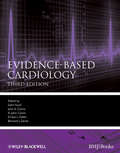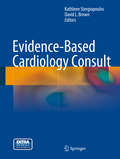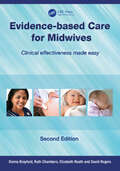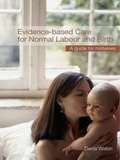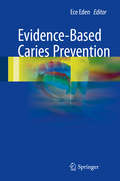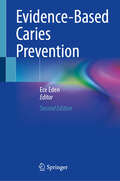- Table View
- List View
Evidence Based Treatments for Trauma-Related Psychological Disorders
by Ulrich Schnyder Marylène CloitreThis book offers an evidence based guide for clinical psychologists, psychiatrists, psychotherapists and other clinicians working with trauma survivors in various settings. It provides easily digestible, up-to-date information on the basic principles of traumatic stress research and practice, including psychological and sociological theories as well as epidemiological, psychopathological, and neurobiological findings. However, as therapists are primarily interested in how to best treat their traumatized patients, the core focus of the book is on evidence based psychological treatments for trauma-related mental disorders. Importantly, the full range of trauma and stress related disorders is covered, including Acute Stress Reaction, Complex PTSD and Prolonged Grief Disorder, reflecting important anticipated developments in diagnostic classification. Each of the treatment chapters begins with a short summary of the theoretical underpinnings of the approach, presents a case illustrating the treatment protocol, addresses special challenges typically encountered in implementing this treatment, and ends with an overview of related outcomes and other research findings. Additional chapters are devoted to the treatment of comorbidities, special populations and special treatment modalities and to pharmacological treatments for trauma-related disorders. The book concludes by addressing the fundamental question of how to treat whom, and when.
Evidence Based Treatments for Trauma-Related Psychological Disorders: A Practical Guide for Clinicians
by Ulrich Schnyder Marylène CloitreThe second, completely updated edition of this book offers an evidence based guide for clinical psychologists, psychiatrists, psychotherapists and other clinicians working with trauma survivors in various settings. It provides easily digestible, up-to-date information on the basic principles of traumatic stress research and practice, including psychological and sociological theories as well as epidemiological, psychopathological, and neurobiological findings. However, as therapists are primarily interested in how to best treat their traumatized patients, the core focus of the book is on evidence based psychological treatments for trauma-related mental disorders. The full range of trauma and stress related disorders is covered, including Acute Stress Reaction, Complex PTSD and Prolonged Grief Disorder, reflecting important anticipated developments in diagnostic classification. Each of the treatment chapters begins with a short summary of the theoretical underpinnings of the approach, presents a case illustrating the treatment protocol, addresses special challenges typically encountered in implementing this treatment, and ends with an overview of related outcomes and other research findings. Additional chapters are devoted to the treatment of comorbidities, special populations and special treatment modalities and to pharmacological treatments for trauma-related disorders. A novel addition is the chapter on Innovative interventions to increase global mental health. The book concludes by addressing the fundamental question of how to treat whom, and when.
Evidence Based Validation of Traditional Medicines: A comprehensive Approach
by Saikat Sen Raja Chakraborty Subhash C. MandalThe demand for traditional medicines, herbal health products, herbal pharmaceuticals, nutraceuticals, food supplements and herbal cosmetics etc. is increasing globally due to the growing recognition of these products as mainly non-toxic, having lesser side effects, better compatibility with physiological flora, and availability at affordable prices. In the last century, medical science has made incredible advances all over the globe. In spite of global reorganization and a very sound history of traditional uses, the promotion of traditional medicine faces a number of challenges around the globe, primarily in developed nations. Regulation and safety is the high concern for the promotion of traditional medicine. Quality issues and quality control, pharmacogivilane, scientific investigation and validation, intellectual property rights, and biopiracy are some key issues that restrain the advancement of traditional medicine around the globe. This book contains diverse and unique chapters, explaining in detail various subsections like phytomolecule, drug discovery and modern techniques, standardization and validation of traditional medicine, and medicinal plants, safety and regulatory issue of traditional medicine, pharmaceutical excipients from nature, plants for future. The contents of the book will be useful for the academicians, researchers and people working in the area of traditional medicine.
Evidence Informed Nursing with Older People
by Irene Schofield Debbie Tolson Joanne BoothEvidence Informed Nursing with Older People is an essential text for nursing students and registered nurses working with older people who are seeking to make connections between theory, evidence and value based gerontological practice. The rapidly rising aging global population requires that more attention is given to the needs and requirements of older people. This textbook is a key resource for nursing students and registered nurses working with older people who wish to improve their practice. Evidence Informed Nursing with Older People takes a unique case-study approach, with individual chapters presenting nursing practice-based case studies on some of the most common areas of care faced by nurses working around the world with older people. Each case study illustrates the connections between practice, theory, evidence and values. User-friendly and accessible, this textbook includes key points, reflection activities, test points, and perspectives from older people throughout. Key features An up-to-date treatment of the nursing contribution to key geriatric syndromes International expert contributions from the UK, Sweden, Switzerland, Australia and China An evidence-based, case-study approach to the care of older people
Evidence Synthesis for Decision Making in Healthcare
by A. E. Ades Nicky J. Welton Keith R. Abrams Alexander J. Sutton Nicola J. CooperIn the evaluation of healthcare, rigorous methods of quantitative assessment are necessary to establish interventions that are both effective and cost-effective. Usually a single study will not fully address these issues and it is desirable to synthesize evidence from multiple sources. This book aims to provide a practical guide to evidence synthesis for the purpose of decision making, starting with a simple single parameter model, where all studies estimate the same quantity (pairwise meta-analysis) and progressing to more complex multi-parameter structures (including meta-regression, mixed treatment comparisons, Markov models of disease progression, and epidemiology models). A comprehensive, coherent framework is adopted and estimated using Bayesian methods.Key features:A coherent approach to evidence synthesis from multiple sources.Focus is given to Bayesian methods for evidence synthesis that can be integrated within cost-effectiveness analyses in a probabilistic framework using Markov Chain Monte Carlo simulation.Provides methods to statistically combine evidence from a range of evidence structures.Emphasizes the importance of model critique and checking for evidence consistency.Presents numerous worked examples, exercises and solutions drawn from a variety of medical disciplines throughout the book.WinBUGS code is provided for all examples. Evidence Synthesis for Decision Making in Healthcare is intended for health economists, decision modelers, statisticians and others involved in evidence synthesis, health technology assessment, and economic evaluation of health technologies.
Evidence Synthesis in Healthcare
by Ara Darzi Thanos AthanasiouEvidence Synthesis in Healthcare - a Practical Handbook for Clinicians is the first book to reveal the field of Evidence Synthesis, by combining multiple sources of quantitative/qualitative data to derive the best evidence for use in healthcare. Through the use of clearly explained examples and practical explanations, Evidence Synthesis in Healthcare - a Practical Handbook for Clinicians describes the practical tools, techniques, uses and policy considerations of evidence synthesis techniques in modern healthcare practice.
Evidence and Hypothesis in Clinical Medical Science (Synthese Library #426)
by John Alexander PinkstonIn this book, the author argues that no current philosophical theory of evidence in clinical medical science is adequate. None can accurately explain the way evidence is gathered and used to confirm hypotheses. To correct this, he proposes a new approach called the weight of evidence account. This innovative method supplies a satisfactory explanation and rationale for the “hierarchical pyramid” of evidence–based medicine, with randomized clinical trials and their derivatives, meta-analyses, and systematic reviews of randomized clinical trials at the top and case reports, case series, expert opinion, and the like at the bottom. The author illustrates the development of various “levels” of evidence by considering the evolution of less invasive surgical treatments for early breast cancer. He shows that the weight of evidence account explains the notion of levels of evidence and other efforts to rank them. In addition, he presents a defense of randomization as a method to maximize accuracy in the conduct of clinical trials. The title also considers ethical issues surrounding experimentation with medical therapies in human subjects. It illustrates and discusses these issues in studies of respiratory therapies in neonates and treatment for certain cancers in adults. The author shows that in many cases sufficient evidence can be accrued to warrant generally accepted new therapies without the need for evidence derived from randomized clinical trials.
Evidence and Rational Based Research on Chinese Drugs
by Gudrun Ulrich-Merzenich Hildebert WagnerAfter the successful introduction of acupuncture to the West, recent advances in analytical methods in chemistry, molecular biology and systems biology - especially the development of the "omic" technologies - have again brought Chinese drugs into the focus of research on Traditional Chinese Medicine (TCM). With more than 1000 publications on the chemistry, molecular biology and pharmacology of TCM drugs in international journals over the last 10 years, Chinese drugs are gaining increasingly reputation and impact. These data offer great opportunities for the development of new pharmaceuticals for various clinical applications. International scientists have compiled relevant and trend setting research results in this book. Topics range from the latest methods of quality and safety assurance by chemical and genetic fingerprints to the development of new pharmaceuticals for a future evidence-based therapy e.g. for cancer, cardiovascular, inflammatory or infectious diseases as well as to recent experimental results on multitarget and synergy research for the preparation of multi-extract-pharmaceuticals from TCM.
Evidence and Skills for Normal Labour and Birth: A Guide for Midwives
by Denis WalshEvidence-based care is a well established principle in contemporary healthcare and a worldwide health care movement. However, despite the emphasis on promoting evidence-based or effective care without the unnecessary use of technologies and drugs, intervention rates in childbirth continue to rise rapidly. This new edition emphasises the importance of translating evidence into skilful practice. It updates the evidence around what works best for normal birth, aspects of which still remain hidden and ignored by some maternity care professionals. Beginning with the decision about where to have a baby, through all the phases of labour to the immediate post-birth period, it systematically details research and other evidence sources that endorse a low intervention approach. The second edition: has been expanded with new chapters on Preparation for Childbirth and Waterbirth highlights where the evidence is compelling discusses its application where women question its relevance to them and where the practitioner's expertise leads them to challenge it gives background and context before discussing the research to date includes questions for reflection, skills sections and practice recommendations generated from the evidence. Using evidence drawn from a variety of sources, Evidence and Skills for Normal Labour and Birth critiques institutionalised, scientifically managed birth and endorses a more humane midwifery-led model. Packed with up-to-date and relevant information, this text will help all students, practising midwives and doulas keep abreast of the evidence surrounding normal birth and ensure their practice takes full advantage of it.
Evidence based diagnostics of musculoskeletal disorders in primary care
by Arianne Verhagen Jeroen AlessieThis book provides an overview of the evidence that underpins history taking, physical examination, specific tests and diagnostic imaging in patients with musculoskeletal disorders that consult primary care.
Evidence based practice in Neuro-oncology
by Supriya Mallick Goura K. Rath Prashanth GiridharThis book provides evidence-based management in neuro-oncology covering all aspects such as pathology, radiology, surgery, radiation, and chemotherapy.The field of neuro-oncology is rapidly evolving and new evidence is coming out every day towards the optimal management of brain tumors. This necessitates a requirement of a complete guide that shall provide an evidence-based and personalized approach towards dealing with patients. This book also covers recent advances in personalized treatment formed through the relevant basis of anatomy, imaging, radiology, surgical, radiation and systemic treatment of brain and spinal tumors. In addition it also covers the , practical aspects of the planning of the Gamma knife and other radio surgical aspects. The book shall provide valuable assistance to practicing neuro-oncologists to practice better evidence-based personalized medicine.
Evidence for Health
by Anne AndermannEvidence for Health: From Patient Choice to Global Policy is a practical guide to evidence-informed decision-making. It provides health practitioners and policy-makers with a broad overview of how to improve health and reduce health inequities, as well as the tools needed to make informed decisions that will have a positive influence on health. Chapters address questions such as: What are the major threats to health? What are the causes of poor health? What works to improve health? How do we know that it works? What are the barriers to implementation? What are the measures of success? The book provides an algorithm for arriving at evidence-informed decisions that take into consideration the multiple contextual factors and value judgements involved. Written by a specialist in public health with a wealth of international experience, this user-friendly guide demystifies the decision-making process, from personal decisions made by individual patients to global policy decisions.
Evidence for Neurosurgery: Effective Procedures and Treatment
by Ronald H. M. A. Bartels Maroeska M. Rovers Gert P. WestertThis book covers spinal, cranial and peripheral nerve surgeries. Each chapter has a uniform format for ease of reading, including a description of the problem, a literature summary and analysis, and conclusions made using evidence-based medicine (including the GRADE method).The scientific evidence for a selection of neurosurgical procedures for well-known pathologic entities is thoroughly summarized and analysed in order to provide an overview of the efficacy and effectiveness of procedures in relation to the target patient population. Evidence for Neurosurgery: Effective Procedures & Treatment is aimed at a professional audience of junior and consultant neurosurgeons, researchers in the area, and policy makers.
Evidence in Anti-Doping at the Intersection of Science & Law
by Marjolaine ViretThis book is a comprehensive, practice-oriented guide to the evidentiary regime under the 2015 World Anti-Doping Code (WADC) including the functioning of the Athlete Biological Passport. It is the first to show how the interplay between science and law affects the collection and evaluation of evidence in anti-doping, and how paradigm shifts in anti-doping strategies may modify evidentiary assumptions implicit to the WADC regime. Unique in its dealing with the subtleties of anti-doping science and legal implications, the book gives lawyers involved in anti-doping the keys to a better understanding of the science underlying the WADC regime, while providing anti-doping scientists with the first reference material to understand the legal framework in which their activities are embedded. The emphasis of the book is on international doping cases and it relies predominantly on CAS awards published up to Spring 2015. Written by an experienced Swiss lawyer it provides an insight into the Swiss legal system and its importance for the legal practice in doping matters. Marjolaine Viret is an attorney-at-law in Geneva, Switzerland, specialising in sports and health law. She has gained significant experience in sports arbitration as a senior associate in one of Switzerland's leading law firms. She also holds positions within committees in sport, in particular as a member of the UCI Anti-Doping Commission. Ms Viret had her doctorate on anti-doping approved summa cum laude in 2015. She participates as a researcher in a project for a commentary of the 2015 WADC funded by the National Science Foundation and is regularly invited to lecture or speak in various fields of sports law. The book appears in the ASSER International Sports Law Series, under the editorship of Dr. Dave McArdle, Prof. Dr. Ben Van Rompuy and Marco A. van der harst LL. M.
Evidence in Breast Cancer
by Supriya Mallick Chitresh Kumar SharmaThe book addresses different aspects in the management of breast cancer, starting from, risk stratification, prevention strategy, diagnostic methods, pathology, molecular aspects, different treatment, survival etc. It highlights the latest evidence available for breast cancer management in tabular algorithmic fashion for easy understanding. The book serves as a handy resource and guide for radiation, surgical and medical oncologists during their residency and early career practitioners in learning evidence-based management of breast cancer. It will also be useful for other branches like Breast and Endocrine surgery, general surgery, onco-anesthesia and palliative medicine, oncology nursing, etc.
Evidence in Medicine: The Common Flaws, Why They Occur and How to Prevent Them
by Iain K. CrombieHigh-quality evidence is the foundation for effective treatment in medicine. As the vast amount of published medical evidence continues to grow, concerns about the quality of many studies are increasing. Evidence in Medicine is a much-needed resource that addresses the ‘medical misinformation mess’ by assessing the flaws in the research environment. This authoritative text identifies and summarises the many factors that have produced the current problems in medical research, including bias in randomised controlled trials, questionable research practices, falsified data, manipulated findings, and more. This volume brings together the findings from meta-research studies and systematic reviews to explore the quality of clinical trials and other medical research, explaining the character and consequences of poor-quality medical evidence using clear language and a wealth of supporting references. The text suggests planning strategies to transform the research process and provides an extensive list of the actions that could be taken by researchers, regulators, and other key stakeholders to address defects in medical evidence. This timely volume: Enables readers to select reliable studies and recognise misleading research Highlights the main types of biased and wasted studies Discusses how incentives in the research environment influence the quality of evidence Identifies the problems researchers need to guard against in their work Describes the scale of poor-quality research and explores why the problems are widespread Includes a summary of key findings on poor-quality research and a listing of proposed initiatives to improve research evidence Contains extensive citations to references, reviews, commentaries, and landmark studies Evidence in Medicine is required reading for all researchers who create evidence, funders and publishers of medical research, students who conduct their own research studies, and healthcare practitioners wanting to deliver high-quality, evidence-based care.
Evidence in Mental Health Care
by Mike Slade Stefan PriebeMental health care increasingly faces a challenge to be 'evidence based'. However, despite much policy activity in the UK, it's still not clear what sort of evidence researchers should be producing for mental health services, or what purchasers should be looking for. Evidence in Mental Health Care evaluates a range of different research methodologies and types of 'evidence', and includes: * a historical and conceptual analysis of what was regarded as evidence in the past, and what impact it has had in mental health care* a presentation of different methodological approaches, and a discussion of their strengths and weaknesses in providing evidence* how evidence is applied in different treatment and care modalities* different angles on the way forward for providing appropriate evidence to improve current mental health care. Evidence in Mental Health Care will prove vital for the successful extension of evidence-based evaluation to mental health services in general. It will be essential reading for researchers, students and practitioners across the range of mental health disciplines, health service managers and purchasers of services.
Evidence of Murder: A Novel Of Suspense (The Theresa MacLean Series #2)
by Lisa BlackFrom a New York Times–bestselling author, “this fast-paced thriller features a lot of detailed forensics with a rip-roaring ending” (Publishers Weekly). Eight months ago, forensic investigator Theresa MacLean lost her fiancé in a bank robbery gone wrong, and she’s had trouble concentrating on her work ever since. But when she investigates the death of a young mother that may have consequences for an innocent child, her attention is riveted by the harrowing case.Jillian Perry has been found dead in the woods, leaving behind a husband of three weeks and a young daughter. The police can’t determine how she died—her body shows no visible marks, and the autopsy reveals nothing suspicious—and the leading theory is that she purposely wandered into the forest and succumbed to the freezing weather. But something doesn’t feel right to Theresa, and she can’t let it go.To complicate matters, a former boyfriend of Jillian’s unexpectedly petitions for custody of her daughter. Obsessed with Jillian, he also suspects foul play in Jillian’s death, and now he and Theresa believe Jillian’s daughter may be in danger of meeting a similar fate. With a child’s life at stake, Theresa must search for evidence of murder—evidence that doesn’t seem to exist—before it’s too late.“Black, a former forensic scientist, knows her stuff and briskly leads readers along the trail of clues behind her likeable, no-nonsense heroine. . . . Smart science propels this intelligent, well-thought out crime thriller.” —Kirkus Reviews“She is, quite simply, one of the best storytellers around.” —Tess Gerritsen, New York Times–bestselling author of the Rizzoli & Isles series
Evidence-Based Assessment Framework for Assistive Technology: The MPT and MATCH-ACES Assessments (Rehabilitation Science in Practice Series)
by Susan A. ZapfThe primary focus of this book is to educate the reader on the Matching Person and Technology (MPT) model and assessment process that will guide the reader on consumer-centered assistive technology assessment and outcome measures designed to be used for individuals of all ages and all types of disabilities. The first section of the book introduces the MPT and Matching Assistive Technology and CHild (MATCH) assessment process and discusses key documents that align with the assessments including the International Classification of Functioning, Disability, and Health and the Occupational Therapy Framework III.The second section of the book focuses on the international emphasis of the MPT and MATCH assessments. At present, there are eight countries that are represented in this section. Each chapter includes information on the assessment translations (with access to copies if available or at least access on how to obtain copies). The authors discuss research on the use of the assessment within their country to support the assessment use. Lastly, a case scenario is discussed in each chapter to provide the reader with an example of how the assessment was used with an actual consumer. The last section of the book includes a focus on outcome studies in the areas of early childhood, education (primary secondary, and postsecondary), work, and functional independence. This section provides the reader insight into how to outline outcome measures within the MPT and MATCH process. There is an additional section on future works that includes a brief introduction to the Service Animal Adaptive Intervention Assessment.This book is targeted to the Assistive Technology Providers (ATP) and policymakers (health care, education, and rehabilitation engineering), the university student pursuing a career in these areas, and the consumer of assistive technology.
Evidence-Based Cardiology
by John Cairns John Camm Salim Yusuf Ernest L. Fallen Bernard J. GershEvidence based Cardiology was first published in 1998 to universal acclaim. Now, with the move towards more patient focused health care and at the same time increased emphasis on health economics, evidence-based practice is a more important force in health care delivery than ever.This new third edition, written by the world's leading cardiologists, provides graded evidence-based reviews of the major trials together with recommendations for optimum management, and now includes new grading and recommendation methodology.This is a unique book in the field of cardiology, and the largest evidence based clinical cardiology text.
Evidence-Based Cardiology Consult
by Kathleen Stergiopoulos David L. BrownThe book will provide a detailed evidence-based approach to key issues in the pathophysiology, diagnosis, and management of patients with concurrent medical issues. It will provide a clinical focus with practical advice on the prevention, diagnosis, and treatment of heart disease supported by an expert's summary, without duplicating other texts. Each chapter will be structured similarly in the following sections: (1) Introduction, (2) Pathophysiology, (3) Diagnosis (4) Management (5) Key Points, (6) Summary of the key guidelines from professional societies where available. The recommendations will have a firm background in the AHA/ACC or ESC recommendations for the management of patients. The intention is to create a comprehensive book rather than a pocketbook or manual. We hope this book will serve as an up to date reference for the practicing clinician. Each of the approximately 40 chapters will have at most 5000 words and 5 -7 high quality figures or illustrations each. Only the highest quality authors will be recruited from the United States and Europe. The emphasis will be on depth of information yet ease of access. This necessitates an approach whereby not a single word, sentence or page of the book will be wasted. Brief where it needs to be brief, detailed where detail is required, this will be a true all-encompassing clinician reference.
Evidence-Based Care for Midwives: Clinical Effectiveness Made Easy
by David Rogers Ruth Chambers Elizabeth Boath Donna BrayfordThis highly practical book is written specifically for midwives, having been developed from the best-selling "Clinical Effectiveness and Clinical Governance Made Easy, Fourth Edition". Requiring no prior knowledge, it provides a straightforward guide to the topics of clinical effectiveness and clinical governance, avoiding jargon but explaining rel
Evidence-Based Care for Normal Labour and Birth: A Guide for Midwives
by Denis WalshEvidence-based care is a well established principle in contemporary healthcare and a world wide health care movement. However, despite the emphasis on promoting evidence-based or effective care without the unnecessary use of technologies and drugs, intervention rates in childbirth are rising rapidly. Evidence-based Care for Normal Labour and Birthbrings to light much of the evidence around what works best for normal birth which has, until now, remained largely hidden and ignored by maternity care professionals. Beginning with the decision about where to have a baby, through all the phases of labour to the immediate post-birth period, it systematically details research and other evidence sources that endorse a low intervention approach. The book: highlights where the evidence is compelling discusses its application where women question its relevance to them and where the practitioner's expertise leads them to challenge it gives background and context before discussing the research to date includes questions for reflection and practice recommendations generated from the evidence. Using research data, Evidence-based Care for Normal Labour and Birthcritiques institutionalised, scientifically managed birth and endorses a more humane midwifery-led model. Packed with up-to-date and relevant information, this controversial book will help all students, practising midwives and doulas keep abreast of the evidence surrounding normal birth and ensure their practice takes full advantage of it.
Evidence-Based Caries Prevention
by Ece EdenThis book aims to define the etiological factors in dental caries and to guide the clinician towards methods of caries prevention that are evidence based. The coverage includes discussion of the active role of the biofilm and the oral environment and emphasizes the multifactorial etiology of dental caries. The opening chapters describe the early detection and diagnosis of dental caries, highlight the value of caries risk assessment to the patient, and explain the dynamic process of the demineralization-remineralization cycle. Information is presented on the action of fluoride, and the evidence relating to the use and effectiveness of remineralization agents and biomimetic materials is reviewed. Additionally, the effects of antimicrobials such as chlorhexidine and ozone are summarized. Further chapters focus on dietary counseling (with information on sweeteners and probiotics), the effectiveness of sealants in caries prevention, and resin infiltration. The philosophy of prophylaxis and ways to improve patient compliance and achieve proper mechanical plaque removal are discussed. The book is concluded with a chapter discussing preventive actions in representative cases.
Evidence-Based Caries Prevention
by Ece EdenThis book, now in an extensively revised second edition, aims to define the etiological factors in dental caries and to guide the clinician towards evidence-based caries prevention methods. The coverage includes a discussion of the active role of the biofilm and the oral environment and emphasizes the multifactorial etiology of dental caries. The opening chapters describe the advanced technological improvements in the early detection and diagnosis of dental caries, highlight the value of caries risk assessment to the patient, and explain the dynamic process of the demineralization–remineralization cycle. Information is presented on the action of fluoride, and the evidence relating to the use, and effectiveness of remineralization agents, with new biomimetic materials are being reviewed. The effects of antimicrobials such as chlorhexidine, ozone, and newly, novel antimicrobial peptides are summarized. The further chapters focus on dietary counseling with information on sweeteners and probiotics, the effectiveness of sealants in caries prevention, and resin infiltration with long follow-up cases. The second edition contains research in relation to the COVID-19 pandemic and the new era of artificial intelligence. The literature on caries prevention through the life course approach is updated. The conclusion chapter of the book, discussing preventive actions in representative cases, now includes the effect of substance abuse on oral health and prevention.
